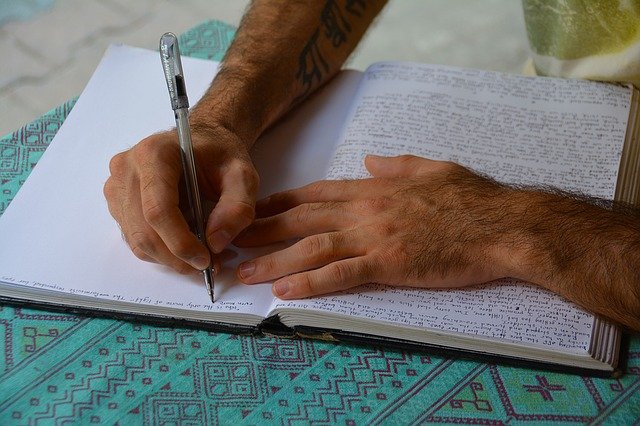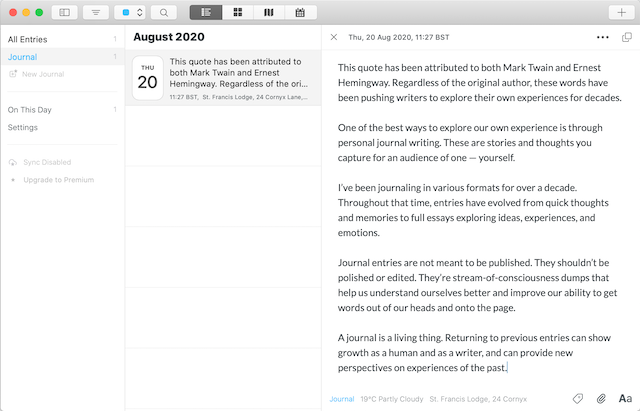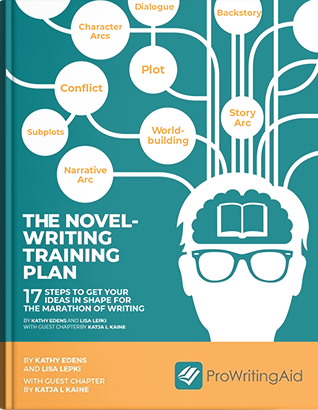
Write what you know.
This quote has been attributed to both Mark Twain and Ernest Hemingway. Regardless of the original author, these words have been pushing writers to explore their own experiences for decades.
One of the best ways to explore our own experience is through personal journal writing. These are stories and thoughts you capture for an audience of one — yourself.
I’ve been journaling in various formats for over a decade. Throughout that time, entries have evolved from quick thoughts and memories to full essays exploring ideas, experiences, and emotions.
Journal entries are not meant to be published. They shouldn’t be polished or edited. They’re stream-of-consciousness dumps that help us understand ourselves better and improve our ability to get words out of our heads and onto the page.
A journal is a living thing. Returning to previous entries can show growth as a human and as a writer, and can provide new perspectives on experiences of the past.
Before we get into what to journal if you’re new to the concept, let’s explore a few tools for journaling.
Journaling Tools
Paper Notebooks
As more things move digital, the act of physically writing is becoming a lost art. Paper notebooks provide a true time capsule of yourself at the moment pen hits paper. A physical journal is a great option, especially if you want to include boarding passes, receipts, or other trinkets to help enhance the entry.
Popular paper journal options include classic composition books, Moleskines, or those fancy leather bound notebooks that tie up.
While paper notebooks are great options to preserve your personal history, they make returning to older entries difficult. This is where digital options can truly shine.
Day One Journal
This is my preferred method. As of writing this, I’ve logged 2,263 entries over six years in Day One. Each entry is dated, stamped with location and weather metadata, and over a thousand have embedded photos.

What a digital journal like Day One does best is remind you of past entries.
Each evening I open Day One and look at the various entries posted on that date in the past. This daily walk through my private history allows me to explore memories and thoughts. I’ve frequently linked to past entries and reflected on past moments with current experiences.
There are many similar options to Day One Journal, including Journey, Momento, and even the Notes app on your phone.
Whatever method of journaling you decide upon, knowing how to begin can be intimidating. Don’t let it be. Remember, a journal is not meant to be read by anyone but yourself. You’re not trying to impress anyone so write what you know: yourself.
When writing about yourself for an audience of yourself, there’s no right or wrong thing to include. Everything is a good idea.
Here are some options to get you started.
What to Journal
Ask Yourself Questions
Each day I ask myself three questions:
- What was significant today?
- What did I learn today?
- What is my goal for tomorrow?
These three questions allow for introspection and exploration of myself in wonderful ways. If you’re just starting with a journal, asking yourself questions creates private writing prompts to get the words flowing.
Gratitude Journal
One great option to journal is capturing moments and people you’re grateful for. Not only does a gratitude journal help you capture wonderful moments that might otherwise get overlooked, it has the added benefit of training ourselves to look for things to be grateful for. This makes us more thankful and patient.
Writing Journal
If you're a professional writer, writing can start to feel less of a pleasure and more of a 9 to 5. It's easy to keep producing content and forget that writing is fun! Writing is something you can always get better at, and keeping a journal is a great way to practice. You can write short stories, articles about things that have interested you, the list is endless. But whatever you write, make sure you're writing it for you.
You can also use a writing journal to see how your writing has progressed over time. If you have a mind for figures, you could run your writing through a tool like ProWritingAid.
The Summary Report will help you learn more about your writing, and it's not all about grammar. You'll be able to see which words or phrases you use (or overuse) most often, whether you favor a particular sentence start, or if you tend to write in long sentences rather than short.
Learning more about your writing can be a fun place to start a journal. You can set yourself goals, or just see how your writing style changes over time.
Travel Journal
If you’re going on a trip, capturing the daily happenings is a great way to chronicle the experience. Including pictures, maps, and commentary on the trip generates your own private travel log.
Beyond just stating what you did, tell the story. Include people you met, smells, feelings, and other details unique to the experience. Capturing these additional details will help enhance your writing outside the journal as well.
Returning to these entries long after travel help bring you back to that place and relive the experience over again.
Reviews
Be it a product, a movie, a book, or a TV show, reviewing something is a great way to just write.
Along with my daily questions, I also include a short review of all content I watch and read throughout the day. As a result I actively engage with content rather than mindlessly consume it.
Quotes
Read something inspiring? Hear something you want to remember? Put it in the journal.
We’re the subject of our own lives and instead of just getting by day to day, journaling allows us to explore our experiences and ourselves. Writing about what we know gives us the opportunity to grow as a person and as a writer.


